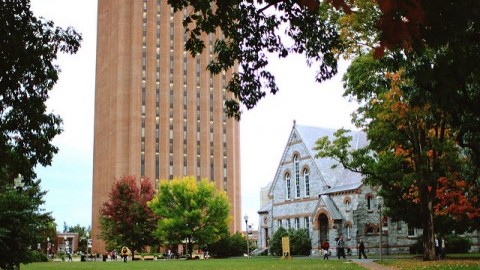If you had asked graduate student and teaching assistant Luz María Sánchez Duque what her plans to continue her research were six months ago, she would have told you about her planned trip to Bolivia in the summer to interview indigenous groups and complete her fieldwork. Now, the pandemic has forced her to reimagine what her dissertation and her methods of conducting research will look like.
Sánchez had been conducting her research for about three years before her plans were flipped upside down.
“It is unlikely I will be able to return to the field…due to the uncertainty of the pandemic… I have to keep moving on with my research, I need to graduate at some point,” said Sánchez, describing her current situation via Zoom from her home country of Colombia.
She is one of many graduate students trying to make do in the unique academic environment created by the pandemic. International graduate students at the University of Massachusetts have continued to work on their research despite facing obstacles due to the novel coronavirus, and those employed by the University as teaching assistants have faced even greater challenges this fall semester.
According to a statement from the Office of News and Media Relations, 7,424 graduate students are enrolled at the University, including those participating in the University Without Walls and non-degree programs. Of these graduate students, 1,927 are international students.
The last two semesters have been a time of great uncertainty for the 1,927 international students in particular.
As the Collegian reported over the summer, the U.S. Immigration and Customs Enforcement (ICE) announced changes to student issued visas rules that would have left international students without a means to obtain a visa if they were only taking online courses for the fall semester.
Antonis Gounalakis, a fifth-year Ph.D. student in the economics department from Greece, experienced first-hand the “anxiety” associated with the ambiguity surrounding student visas as he was residing in Amherst.
Although he feels that international students had always been at a disadvantage under the Trump administration, he recalled the heightened uncertainty during the one month period in which the order was in place, explaining that “we spent one month in agony not able to work, not knowing whether we would be able to stay or leave or have to move out.”
Gounalakis acknowledges that the University did not have control over national policies. However, he wishes that the University provided greater support and resources to its international students “in the time of need.”
“The administration didn’t only not enhance the [International Programs Office] … they put staff into furlough…instead of providing resources they pulled resources,” Gounalakis said.
He continued expressing his disagreement about the University’s methods of cutting down on expenses, which have impacted him directly as a teaching assistant.
“…Despite the fact that they don’t have a decrease in tuition revenue…they are currently cutting expenses by cutting wages to personnel throughout campus [while] at the same time charging students full tuition while being online,” Gounalakis said.
Sánchez expressed a similar sentiment surrounding the actions taken by the University. She explained that faculty have been very helpful and “have been doing good work [in] putting together material workshops, training and resources to help graduate students to deal with this” but added that she hasn’t seen a “commitment from the upper hierarchies of the University” to prioritize the “financial and economic security of grad students.”
For doctorate students approaching the end of their program, “the prospects of getting a job are kind of totally dark,” Sánchez said, and “institutional support” from the University may ease some of the “stress and uncertainty” created by the situation.
Coşku Mihci, an international Ph.D. candidate in the economics department from Turkey, has experienced challenges to his living accommodations and research on account of the ongoing global health crisis.
Due to the current uncertainty of international flights, he has found himself stuck in “the United States since the previous December, so around 10 months right now.”
The pandemic has also presented challenges to his work arrangements.
The nearly completely virtual format of classes this semester has come with frustration, and as a teaching assistant, Mihcihas felt a heightened sense of disconnect from the students he teaches. Although he is “fortunate” to be working as a TA, he thinks “we are getting less feedback from the students because of all the social distancing. We are not getting the sentiment of the students.”
Mihci finds that “concentration is decreasing” due to a lack of separation from work and normal life. He added that in these conditions, “our physical health is also decreasing, along with our mental health.”
As a third-year student also working on research, he noticed that by only being able to read and discuss his research with an advisor, graduate students end up “decreasing the outside input” from fellow students, which can come in the form of advice, suggestions or discussion.
Despite the obstacles described by Mihci, graduate students persist in their efforts to use the limited resources that they do have.
Sánchez is continuing her research, which focuses on the defense of indigenous land by indigenous groups in Bolivia, and the issues of environmental protection, populism and democracy through the lens of her main topic.
The interviews that her research so heavily relies on are difficult to complete remotely, as many of the people she needs to interview don’t have access to the necessary technology. She had planned to complete her fieldwork with another trip to Bolivia last summer.
“With the pandemic of course that plan fell apart…fortunately, I had that first visit,” Sánchez said.
Due to the uncertainty of her situation, Sánchez is unsure of whether she will return to either Amherst or Bolivia soon, or complete the rest of her dissertation in Colombia. She has had to shift her focus to consider what she can do with the materials she already collected and had access to, rather than what she originally envisioned. Sánchez said she is considering how she can “take advantage of what I already did to develop and keep moving on my dissertation.”
She has learned to be more flexible throughout this process.
“That’s a lesson from this pandemic… I need to be open to possibilities I haven’t been open to exploring before” Sánchez says.
Saliha Bayrak can be reached at [email protected]. Follow her on Twitter @salihabayrak. Sara Abdelouahed can be reached at [email protected]. Follow her on Twitter @AbdelouahedSara.




















